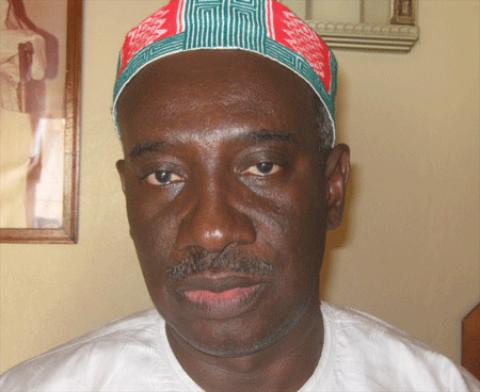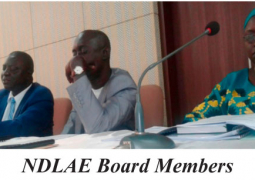
The Prosecutors welcomed the efforts of the international community and the contributions of the international and hybrid courts and tribunals as well as the national courts in combating impunity for international crimes. The Prosecutors also called upon the international community to provide support to the ad hoc international and hybrid tribunals, their respective residual mechanisms, the International Criminal Court to enable them to fully implement their important independent mandates and to assist states discharge their primary responsibility to investigate and prosecute international crimes. They further called on all states to ensure the adequacy of their laws and legal systems to enable them to discharge effectively and fairly this primary responsibility.
Speaking at the occasion, Justice Hassan B. Jallow, Prosecutor of the International Criminal Tribunal for Rwanda and the Mechanism for International Criminal Tribunals stated, “The choice of the theme of the Colloquium: Local Prosecution of International Crimes, Challenges and Prospects; as well as the presence of national prosecutors from some 20 countries are not fortuitous. Both have been dictated by the transition at which international criminal justice stands today with the impending closure of the ad hoc and hybrid tribunals a few years hence. The theme emphasizes that primary responsibility for the investigation and prosecution of international crimes now rests with national jurisdictions”.
Prosecutor Jallow emphasized “the need to retain the international criminal justice option to deal with cases which states were unable or unwilling to prosecute but that the limitations of this system and the distinct advantages of local justice makes it also necessary to empower local jurisdictions to prosecute international crimes.”
In his closing remarks at the Colloquium, the Under-Secretary General for Legal Affairs and United Nations Legal Counsel, Mr Miguel de Serpa Soares, highlighted the increasingly important role of domestic prosecution of international crimes in supporting, enhancing and complementing the work of the tribunals. He emphasized, “the centrality of the principle of complementarity to the system of international criminal justice”. He considered “supporting national proceedings in this manner to be of fundamental importance”.
The 7th Colloquium of International Prosecutors was attended by some 20 national prosecutors from all over the world particularly the Africa region and by international prosecutors including Justice Hassan B. Jallow Prosecutor of the International Criminal Tribunal for Rwanda and the Mechanism for International Criminal Tribunals, Ms Fatou Bensouda Prosecutor of the International Criminal Court and her deputy Mr James Stewart, Ms Brenda Hollis Prosecutor of the Residual Special Court for Sierra Leone, Mr Ekkehard Withopf Acting Chief of Prosecutions of the Special Tribunal for Lebanon, Mr Vincente de Wilde d’Estmael Senior Assistant Co-Prosecutor at the Extraordinary Chambers in the Courts of Cambodia, Mr Bob Reid Chief of Operations at the ICTY, and Mr Stephen Rapp, United States Ambassador-At-Large Office of Global Criminal Justice. The participants also included other Gambian lawyers: Janet Sallah-Njie, Alhaji Marong, and Ba Tambadou, in addition to Justice Hassan B. Jallow and Fatou Bensouda.
The Resolution adopted by the Colloquium is annexed to this Release.
WE THE PROSECUTORS AND PARTICIPANTS OF THE 7TH COLLOQUIUM OF INTERNATIONAL PROSECUTORS HELD UNDER THE AUSPICES OF THE INTERNATIONAL CRIMINAL TRIBUNAL FOR RWANDA (ICTR) IN ARUSHA, TANZANIA
TAKING NOTE of the 20th anniversary of the Rwandan genocide of 1994 and of the 20th anniversary of the establishment by the United Nations of the International Criminal Tribunal for Rwanda (ICTR);
EMPHASISING the importance of accountability for international crimes, which are gross violations of human rights, in the interests of justice, peace, security, and the well-being of the world, as well as the role and responsibility of the international community in ensuring such accountability;
WELCOMING the efforts of the international community and the contribution of the international and hybrid courts and tribunals as well as national judicial and other authorities in combating impunity for international crimes and ensuring justice and accountability;
RECOGNISING the need for effective partnership and enhanced synergies between local and international justice efforts in order to secure, in a comprehensive manner, accountability for international crimes;
RECALLING the primary responsibility of States to investigate and prosecute such crimes and the need for them to take effective measures to ensure the full discharge of that responsibility, including through the provision of conditions which, inter alia, support an impartial judiciary and an independent, effective and well-resourced prosecution and defence;
RECALLING further that it is incumbent on the international community to foster conditions necessary to enable genuine, fair and effective national prosecutions in communities affected by mass criminality;
NOW THEREFORE
CALL ON the international community together with national authorities to provide adequate support to the ad hoc international and hybrid tribunals, their respective residual mechanisms and the International Criminal Court (ICC) to enable them to fully implement their critical independent mandates;
REQUEST the international and hybrid tribunals to intensify their work on best practices and lessons learned and projects for the compilation and sharing of such lessons and practices, so as to provide guidance in the local and international prosecution of international crimes, and for the international community to support such projects;
FURTHER REQUEST States, in particular judicial and other national authorities, to share experiences, practices and lessons to assist in the prosecution of international crimes and in doing so draw from the experience of international courts and tribunals;
CALL ON all States to adopt appropriate measures and strategies to end impunity and thereby contribute to the prevention of the commission of international crimes, including through the creation and support of the necessary conditions for justice, and respect for human rights within their jurisdictions;
FURTHER CALL ON all States to ensure the adequacy of their laws and legal systems to enable them to discharge effectively and fairly their primary responsibility for the investigation and prosecution of international crimes through, inter alia, the ratification of relevant international treaties and the adoption of implementing legislation;
URGE the international community to establish and support existing effective mechanisms for the training of personnel andcapacity building of local systems for the prosecution of international crimes and for supporting local prosecution of such crimes to ensure effective compliance with international standards;
FURTHER URGE the international community to provide adequate support to States to enable them to implement necessary measures to empower their legal systems to prosecute such crimes;
CALL on the international community and national authorities to deploy greater efforts to ensure effective accountability for all international crimes.
DONE AT ARUSHA, TANZANIA, THIS 5TH DAY OF NOVEMBER 2014.



